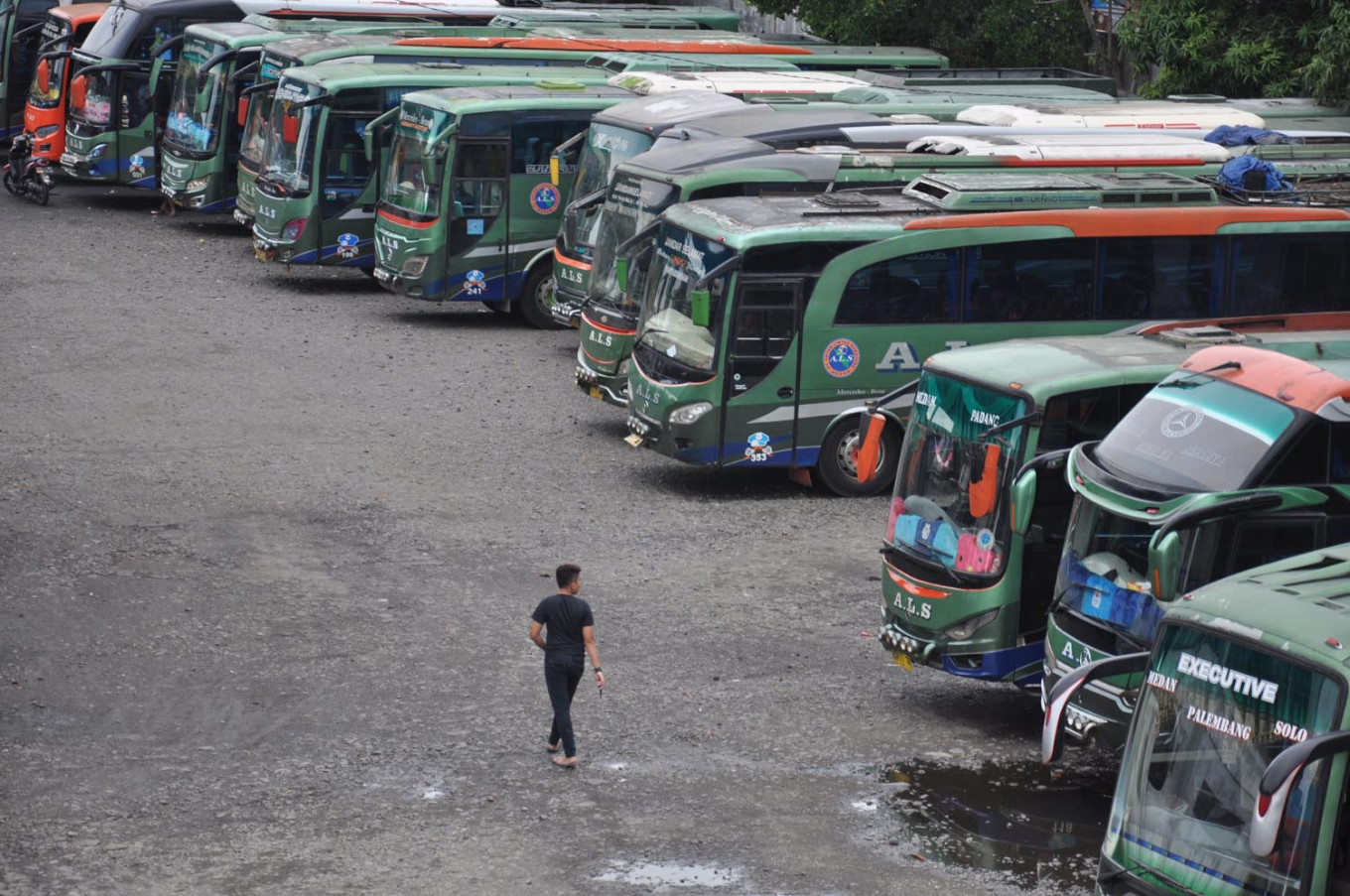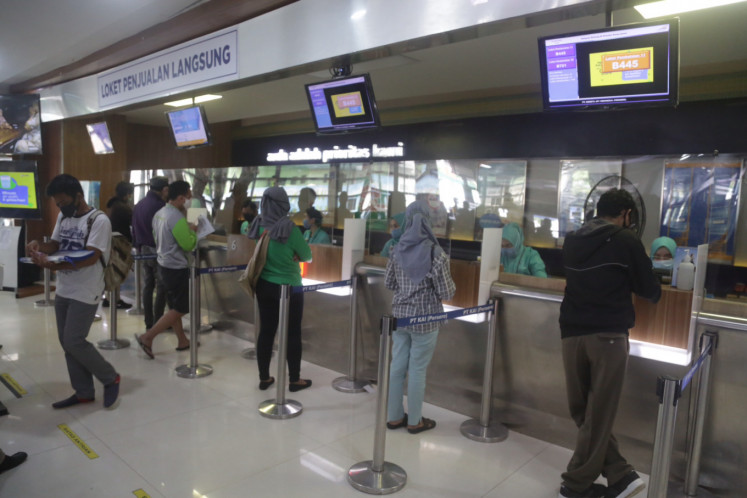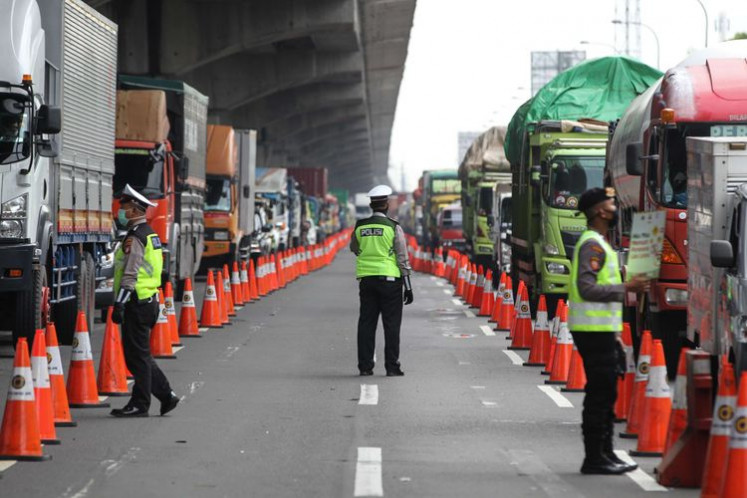Popular Reads
Top Results
Can't find what you're looking for?
View all search resultsPopular Reads
Top Results
Can't find what you're looking for?
View all search resultsExplainer: What’s allowed and what’s not in Indonesia's ‘mudik’ ban
Key takeaways of Transportation Ministry Regulation No. 25/2020, which bans Idul Fitri travel.
Change text size
Gift Premium Articles
to Anyone
The Transportation Ministry has temporarily restricted passenger travel during the period of April 24 until May 31 in an effort to prevent an Idul Fitri mudik (exodus) as the country struggles to contain the spread of COVID-19 across the archipelago.
The mudik ban, which is based on Transportation Ministry Regulation No. 25/2020 signed by acting minister Luhut Pandjaitan on April 23, applies to all types of mass transportation as well as to private vehicles and is seen as crucial to prevent the coronavirus from spreading from the epicenter of Jakarta and West Java to other regions of the country. The mudik is an important annual tradition for most people in the Muslim-majority country to celebrate Ramadan and Idul Fitri, which falls in late May this year.
Last year, around 18 million people traveled using public transportation during the seven days before and after Idul Fitri. As many as 5.41 million people traveled by air, 2.85 million by land transportation, 1.17 million by sea transportation, 6.20 million by rail and 2.51 million by ferries.
However, the ban has caused some confusion among would-be passengers, operators and transportation companies, as the regulation was made public a day after the announcement while at the same time the ministry’s officials made several changes in their statements.
The Jakarta Post summarizes key takeaways from the regulation to help clear up any confusion.
Mudik ban coverage area
The ban applies to the use of private cars and motorcycles, public busses, trains, ships, ferries and chartered and scheduled flights entering and leaving areas that have imposed large-scale social restrictions (PSBB), red zone areas and agglomeration areas.
An agglomeration area is a group of closely connected neighboring areas with one or several of them having implemented the PSBB or been declared a red zone. An example of this is Greater Jakarta, which consists of Jakarta and its satellite cities Tangerang in Banten as well as Bogor, Depok and Bekasi in West Java.
Greater Bandung, which consists of Bandung city, Bandung regency and Cimahi city in West Java, is also categorized as an agglomeration area.
As of April 27, as many as two provinces and 22 regencies/cities have implemented the PSBB, which include Greater Jakarta, Greater Bandung, Tegal in Central Java, Surabaya, Sidoarjo and Gresik in East Java and Makassar in South Sulawesi. COVID-19 cases have been found in all 34 provinces of Indonesia and in 249 of 514 regencies/cities.
International travel
The mudik ban applies to domestic travel only and does not affect international travel.
Civil Aviation Director General Novie Riyanto said on April 24 that people were still allowed to travel overseas since the regulation on the mudik was only applicable to domestic passenger travel.
“Yes, [international travel] is allowed as long as the destination countries are still accepting passengers from Indonesia,” he said.
Novie also said that all Indonesians overseas who wanted to return to Indonesia were allowed to fly in.
Ticket refunds
The regulation requires all airlines and transportation operators and companies to refund in full any tickets issued for travel within the period of the ban. The refund can be in form of cash, credit points, ticket vouchers or other forms agreed by the companies and passengers.
The passengers also have the option to reschedule or reroute their cancelled tickets free of charge.
Exemptions from the ban
The mudik ban comes with several exceptions for certain vehicles and conditions. In land transportation, operational vehicles and trains for logistics, goods, medicines and medical equipment transportation as well as firefighter vehicles, ambulance and hearses are still allowed to move freely.
High-ranking officials, the COVID-19 task force officers, government operational officers, the Indonesian Army, the National Police as well as toll road officials may still travel on duty.
Land and railway transportation operating within an agglomeration area, such as Greater Jakarta, can continue operations with strict implementation of physical distancing rules.
Greater Jakarta Transportation Agency (BPTJ) head Polana B. Pramesti said people were allowed to travel within Greater Jakarta using private vehicles and public transportation.
“The operation of public transportation within Greater Jakarta is allowed,” she stated.
In air transportation, flights for high-ranking officials, state guests and representatives of international organizations and foreign consulates and embassies in Indonesia as well as repatriation, law enforcement and emergency services flights are exempted from the ban.
Airport operations, however, remain normal to serve cargo flights and a few passenger flights that enter and leave areas outside PSBB, red zones and agglomeration areas.
At sea, the regulation exempts passenger ships for repatriation, logistics, state and medical services as well as regular ships that travel within agglomeration areas.
Law enforcement
To oversee the implementation of the ban, the Transportation Ministry, along with the National Police Traffic Corps, have established checkpoints at certain locations, such as toll gates, passenger bus terminals, seaports and airports, to prevent any illegal travel.
The officials will instruct car drivers trying to leave a PSBB, red zone or agglomeration area during the period of April 24 to May 7 to return to their point of departure. Starting on May 8, drivers of such cars will get additional sanctions “in accordance with the prevailing law”.
Ships operators and airlines that violate the ban will be charged with sanctions that range from written reprimand to a revocation of licenses.












